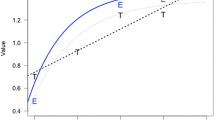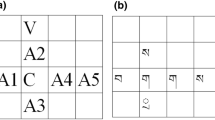Summary
The effects of script (kanji and katakana), lexicality (word and nonword), and string length (1, 2, and 4 characters) on the identification of briefly exposed kanji and katakana strings were examined. It was found that identifiability is far higher for kanji words than for katakana words, even though the former are visually more complex than the latter. However, the superiority of kanji completely disappeared in a nonword context, suggesting that it is not visual perceptibility that enhances identifiability of kanji words, but something else, perhaps inferability. Differing effects of visual complexity and form were also found. A theory that explains these results is presented.
Similar content being viewed by others
References
Feldmann, L. B., & Turvey, M. T. (1980). Words written in kana are named faster than the same words written in kanji.Language and Speech, 23, 141–147.
Goryo, K. (1987).Yomu toiukoto (On reading). Tokyo: Tokyo University Press.
Haber, R. N. (1965). Effect of prior knowledge of the stimulus on word-recognition process.Journal of Experimental Psychology, 69, 282–286.
Hayashi, O. (1982).Zusetsu nihongo (Japanese in diagrams). Tokyo: Kadokawa shoten.
Kaiho, H. (1984).Kanji o kagakusuru (Investigating kanji scientifically). Tokyo: Yuhikaku.
Kaiho, H., & Inukai, Y. (1982). Kyoiku kanji no gaikeitokucho no shinriteki bunseki (An analysis of Gestalt characteristics of 881 Japanese/Chinese kanji).Sinrigaku Kenkyu (Japanese Journal of Psychology), 53, 312–315.
Kaiho, H., & Nomura, Y. (1983).Kanji johoshori no shinrigaku (The psychology of kanji information processing). Tokyo: Kyodo shuppan.
Kimura, Y. (1981). Concurrent vocal interference: Its effects on kana and kanji.Quarterly Journal of Experimental Psychology, 36A, 117–131.
Neisser, U. (1967).Cognitive psychology. New York: Appleton-Century-Crofts.
Nomura, Y. (1981). Kanji, kana hyokigo no johoshori: Yomi niokeru data suishingata to gainen suishingata no koka (The information processing of kanji, kana script: The effects of data-driven and conceptually driven processing on reading).Sinrigaku Kenkyu (Japanese Journal of Psychology),51, 327–334.
Saito, H. (1981). Kanji to kana no yomi niokeru keitaiteki fugoka oyobi on-inteki fugoka no kento (Use of graphemic and phonemic encoding in reading kanji and kana).Shinrigaku Kenkyu (Japanese Journal of Psychology),52, 266–273.
Smith, E. E., & Haviland, S. E. (1972). Why words are perceived more accurately than nonwords: Inference vs. utilization.Journal of Experimental Psychology, 92, 59–64.
Solomon, R. L., & Postman, L. (1952). Frequency of usage as a determinant of recognition thresholds for words.Journal of Experimental Psychology, 43, 195–201.
Umemura, C. (1981). Kana to kanji no moji-kinosa nitsuite: Kiokukadai niyoru kento (Functional properties of Japanese letters [kana and kanji] in memory studies).Kyoiku Shinrigaku Kenkyu (Japanese Journal of Educational Psychology),29, 123–131.
Woodworth, R. S. (1938).Experimental psychology. New York: Henry Holt and Company.
Author information
Authors and Affiliations
Rights and permissions
About this article
Cite this article
Yamada, J., Mitarai, Y. & Yoshida, T. Kanji words are easier to identify than katakana words. Psychol. Res 53, 136–141 (1991). https://doi.org/10.1007/BF01371821
Received:
Accepted:
Issue Date:
DOI: https://doi.org/10.1007/BF01371821




